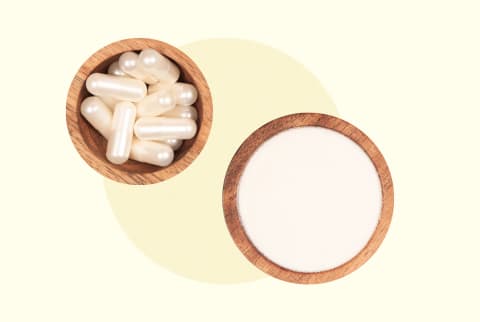Collagen is turned into collagen peptides through the process of hydrolysis (why you’ll often hear these called “hydrolyzed collagen” or “collagen hydrolysate”). In order for our bodies to reap the benefits of collagen, it must be broken down into these amino acid chains so we can absorb it through our digestive tract and into the bloodstream.* Essentially: If it’s not hydrolyzed, it’s not useful. Roughly 80 to 90% of collagen1 belongs to Type I, II, and III. Each has a different amino acid composition and thus serves different functions in the body. Type I2 is important for bone, teeth, and skin formation and is predominant in the tissue and tendons. Type II3 is mostly known for its role as structural support in cartilage. Type III4 is found in skin, muscle, and blood vessels. Beyond the different types of collagen, it’s important to note that there are two terms used to classify it. First, endogenous collagen is natural collagen, or the kind that is synthesized by the body. Second, exogenous collagen is synthetic and comes from an external source, such as a powder. (So collagen supplements are made of exogenous collagen.) Endogenous collagen depletion is linked to a declining bill of health. The thought is that collagen plays a role in forming a cluster of cells, or fibroblasts, that allow new cells to grow while helping replace dead skin cells.* Fibroblasts are critical for skin health and wound healing.* Collagen has also been found to support accelerated hair growth and wound healing7, according to a study in the Journal of Investigative Dermatology.* We also need vitamin C to synthesize collagen. So, while the jury is still out on all the hype about collagen skin care products, adding vitamin-C serums and oils to your routine may help naturally stimulate collagen production in the body. Additionally, glutamine8, one of collagen’s other amino acids, is key for managing gut inflammation and inhibiting oxidative stress of the intestines.* Healthy collagen levels have been shown to help support proper gut acidity8, which may help manage painful heartburn and digestion issues.* It is also known that collagen is essential for supporting the intestinal wall.* In fact, collagen supplements may help support the stomach lining9, too, according to the journal Gastroenterology.* On the flip side, research from the Journal of Clinical Pathology has found decreased collagen in those with digestive troubles, specifically, an association between IBS and diminished collagen levels10. Some research from the International Journal of Medical Sciences has found that collagen may manage painful symptoms11 in those with joint conditions.* While the exact biological mechanism for how collagen supplementation supports joint pain remains unclear, scientists surmise that collagen may not really boost your endogenous collagen supply; rather, it promotes normal inflammatory processes, thereby managing the overall symptoms.* Perhaps that’s why William Cole, D.C., IFMCP, a functional medicine expert and mbg Collective member, says regarding his patients who take collagen supplements: “Not only do they notice their skin becoming brighter, nails becoming stronger, hair becoming more luminous, but they often experience less joint pain.”* See, high sugar intake increases the rate of glycation12, forming these molecules known as AGEs that wreak havoc on and degrade other proteins. Over time, too much sugar can cause a weakening and depletion of collagen. Therefore, tissue cannot regenerate and is more likely to become damaged and die," board-certified dermatologist Gary Goldenberg, M.D., previously told mbg about the relationship between smoke and collagen. (See here for even more reasons collagen can decline.) Of course, there’s also collagen powder. But not all collagen peptide proteins are created equal. Grass-fed bovine collagen contains both collagen Type I and III, making it the most effective choice for full-body benefits, including skin, gut, and bone health.* Be sure to look for a brand that uses third-party testing and that has been branded clear of any potential contamination, like heavy metal toxicity. Especially because most collagen comes from animal parts, it’s important to check that you’re buying from a high-quality and reputable source that only uses grass-fed options. However, you want to make sure you’re seek out a supplement from a reputable company with third-party verifications on the label, just to make sure there aren’t any contaminants. Grass-fed, pasture-raised is the way to go, as it’s derived from cows raised in strict standards—which ensures better quality. Of course, if you have a beef allergy, you’ll want to steer clear. And if you’re taking any medications, it’s best to consult your primary care doctor to make sure taking collagen won’t interfere. Still, you should speak to your doctor if you have any concerns about taking collagen daily, or at all, for that matter. Rather, stick to a schedule that’s most convenient for you. If you’re looking to make collagen supplements part of your daily routine, it helps to choose to a time you’ll actually stick to.




